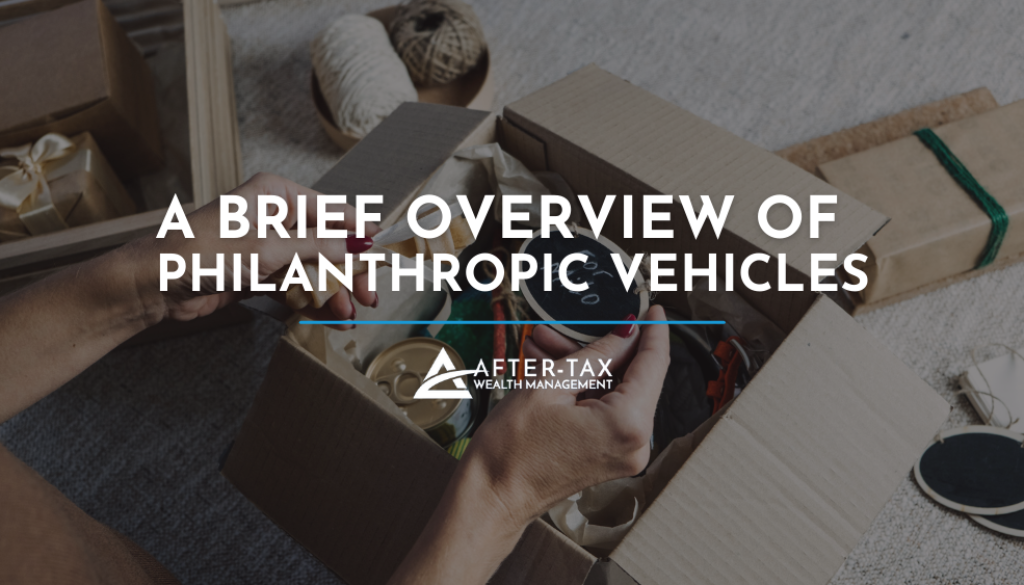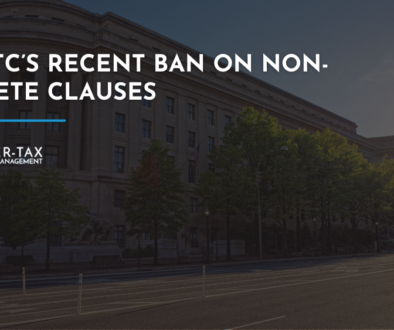A Brief Overview of Philanthropic Vehicles
As you grow your wealth, you may find the desire to give back to others and support causes and organizations you believe in through philanthropic giving. Philanthropy often casts a broader net of giving over charity as it helps society or organizations flourish over time. While the goal of philanthropic giving is on the impact it makes, it also may help reduce your income tax, capital gains, and estate taxes.
Once you determine what charity you would like to support, research the charity using charitynavigator.org to find the charity’s rating, operating, and financial information. Next, work with your financial and tax professionals to determine which philanthropic vehicles may be appropriate for your situation. Here are vehicles and investment strategies you may want to consider depending on your unique situation:
IRA Qualified Charitable Distributions (QCDs) – If you’re age 70 1/2 or older, you can use a qualified charitable distribution or QCD to donate directly from your IRA to the charity of your choice. QCDs count toward your required minimum distributions (RMDs) for tax purposes. However, you cannot claim the RMD amounts as charitable donations if you itemize your deductions.
Without using a QCD, taking a distribution from your IRA and donating it to charity may be more expensive for you since the distribution may be more than the IRS charitable deduction due to the limits to philanthropic contributions under the IRS code. It would be appropriate if you talked to your tax and financial professionals before using a QCD strategy for philanthropic giving.
Donor-Advised Funds (DAFs)- You can donate cash or other assets to a charitable investment account and receive a tax deduction immediately with a DAF. Since a DAF grows tax-free, you may distribute funds over time to organizations and causes or time your contributions to coincide with higher-income years for a more significant tax deduction.
Private Foundations- A private foundation is an independent legal entity set up solely for charitable purposes. The funding is typically provided by an individual, a family, or a corporation, which receives a tax deduction for donations. A private foundation is controlled by the donor, which determines:
· The mission of the foundation
· Who is on the board
· Where the funds are invested
· How, where, and when the funds are given away
To determine if forming a private foundation is appropriate for you, consult a legal professional as there are rules and regulations to follow, reports to file, and costs associated with it.
Charitable Trusts – The two types of charitable trusts you may want to incorporate into your financial plan include charitable lead trusts (CLTs) and charitable remainder trusts (CRTs) that benefit the charity of your choice and you as a donor:
A charitable lead trust (CLT) is an irrevocable trust designed to reduce transfer taxes upon inheritance that can be funded with cash, publicly traded stock, real estate, private business interests, private company stock, and other assets.
Charitable remainder trusts (CRTs) are irrevocable trusts that let you donate assets to charity and draw annual income for life or a specific period.
If you plan to include securities in your trust, it is essential that you consult financial and legal professionals before drafting your trust documents and forming your trust.
Now that you know some of the philanthropic vehicles used to benefit charities, meet with your financial, legal, and tax professionals to determine if any of them are appropriate for your situation.
Important Disclosures
The opinions voiced in this material are for general information only and are not intended to provide specific advice or recommendations for any individual.
This information is not intended to be a substitute for specific individualized tax or legal advice. We suggest that you discuss your specific situation with a qualified tax or legal advisor.
LPL Financial Representatives offer access to Trust Services through The Private Trust Company N.A., an affiliate of LPL Financial.
All information is believed to be from reliable sources; however LPL Financial makes no representation as to its completeness or accuracy.
This article was prepared by Fresh Finance.
LPL Tracking #1-05326016
Sources: https://www.investopedia.com/terms/p/philanthropy.asp https://foundationsource.com/learn-about-foundations/what-is-a-private-foundation/ https://www.investopedia.com/terms/c/charitableleadtrust.asp https://www.irs.gov/charities-non-profits/charitable-remainder-trusts




